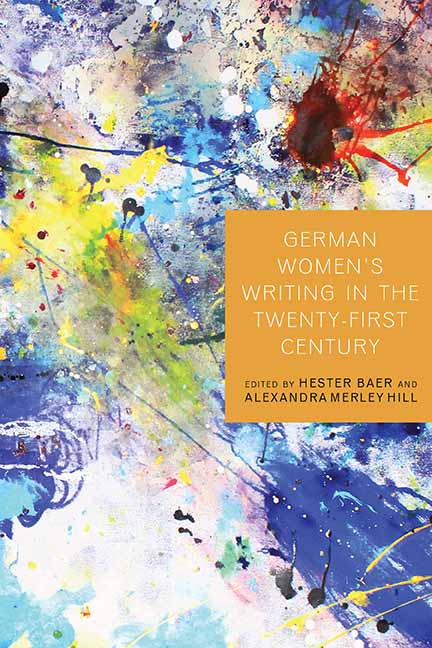Book contents
- Frontmatter
- Dedication
- Contents
- Acknowledgments
- Introduction: German Women’s Writing Beyond the Gender Binary
- 1 Language-Bodies: Interpellation and Gender Transition in Antje Rávic Strubel’s Kältere Schichten der Luft and Judith Hermann’s “Sonja”
- 2 Matrilineal Narrative and the Feminist Family Romance
- 3 The Pitfalls of Constructing a Female Genealogy: Cultural Memory of National Socialism in Recent Family Narratives
- 4 Reckoning with God: Attitudes toward Religion in German-Language Women’s Writing in the Twenty-First Century
- 5 Muslim Writing, Women’s Writing
- 6 Popfeminism, Ethnicity, and Race in Contemporary Germany: Hatice Akyün’s Popfeminist Autobiographic Works Einmal Hans mit scharfer Soße (2005) and Ali zum Dessert (2008)
- 7 The Awkward Politics of Popfeminist Literary Events: Helene Hegemann, Charlotte Roche, and Lady Bitch Ray
- 8 The Indictment of Neoliberalism and Communism in the Novels of Katharina Hacker, Nikola Richter, Judith Schalansky, and Julia Schoch
- 9 Sounds of Silence: Rape and Representation in Juli Zeh’s Bosnian Travelogue
- Bibliography
- Notes on the Contributors
- Index
3 - The Pitfalls of Constructing a Female Genealogy: Cultural Memory of National Socialism in Recent Family Narratives
Published online by Cambridge University Press: 25 May 2021
- Frontmatter
- Dedication
- Contents
- Acknowledgments
- Introduction: German Women’s Writing Beyond the Gender Binary
- 1 Language-Bodies: Interpellation and Gender Transition in Antje Rávic Strubel’s Kältere Schichten der Luft and Judith Hermann’s “Sonja”
- 2 Matrilineal Narrative and the Feminist Family Romance
- 3 The Pitfalls of Constructing a Female Genealogy: Cultural Memory of National Socialism in Recent Family Narratives
- 4 Reckoning with God: Attitudes toward Religion in German-Language Women’s Writing in the Twenty-First Century
- 5 Muslim Writing, Women’s Writing
- 6 Popfeminism, Ethnicity, and Race in Contemporary Germany: Hatice Akyün’s Popfeminist Autobiographic Works Einmal Hans mit scharfer Soße (2005) and Ali zum Dessert (2008)
- 7 The Awkward Politics of Popfeminist Literary Events: Helene Hegemann, Charlotte Roche, and Lady Bitch Ray
- 8 The Indictment of Neoliberalism and Communism in the Novels of Katharina Hacker, Nikola Richter, Judith Schalansky, and Julia Schoch
- 9 Sounds of Silence: Rape and Representation in Juli Zeh’s Bosnian Travelogue
- Bibliography
- Notes on the Contributors
- Index
Summary
WRITING WOMEN's LIVES has always been central to the feminist project. In the 1970s confessional and autobiographical writing by women contributed to and popularized a feminist politics of self-discovery, autonomy, and solidarity. Questioning the relationship between language and the subject, the body and culture, female authors asserted the social and historical import of their experiences. Notably, women's writing provided insight into women's experiences of war and the Third Reich at a stage when feminist history of the period was still in its infancy. And now, in the twenty-first century, women writers are continuing to revisit the National Socialist past and its psychological legacy from a female perspective. The recent proliferation of autobiographical and fictional family narratives, written by women about women, suggests that there remain important stories to be told about the women who lived through the Nazi period in Germany. The female narratives that are typically sidelined in family and cultural memory are a pivotal concern in the memoirs Das endlose Jahr (The Endless Year, 2002) by Gisela Heidenreich, Stille Post (Chinese Whispers, 2007) by Christina von Braun, and Schweigen tut weh (The Pain of Silence, 2007) by Alexandra Senfft. These authors believe that autobiography can fill in the gaps of “official” narratives regarding women's subjective experience of history. Reflecting on the processes through which family and cultural memory are produced and gendered in the German context, they expose the exclusionary structures of cultural memory. Their works enable us to trace the social and political processes through which memory becomes inflected by gender. Recent memory narratives by women thus shed light on a question that has guided feminist interventions into memory studies: “Who wants whom to remember what and why?”
Moreover, each author treated in this chapter reflects on what it means for her, as a mother and a daughter, to confront the family past. The authors structure their narratives around the testimonial objects— diaries, photographs, and letters—through which they have gained access to the past. Integrating these objects into their writing, Heidenreich, Senfft, and von Braun unfold in front of the reader gendered forms of memory transfer.
- Type
- Chapter
- Information
- German Women's Writing in the Twenty-First Century , pp. 54 - 73Publisher: Boydell & BrewerPrint publication year: 2015

